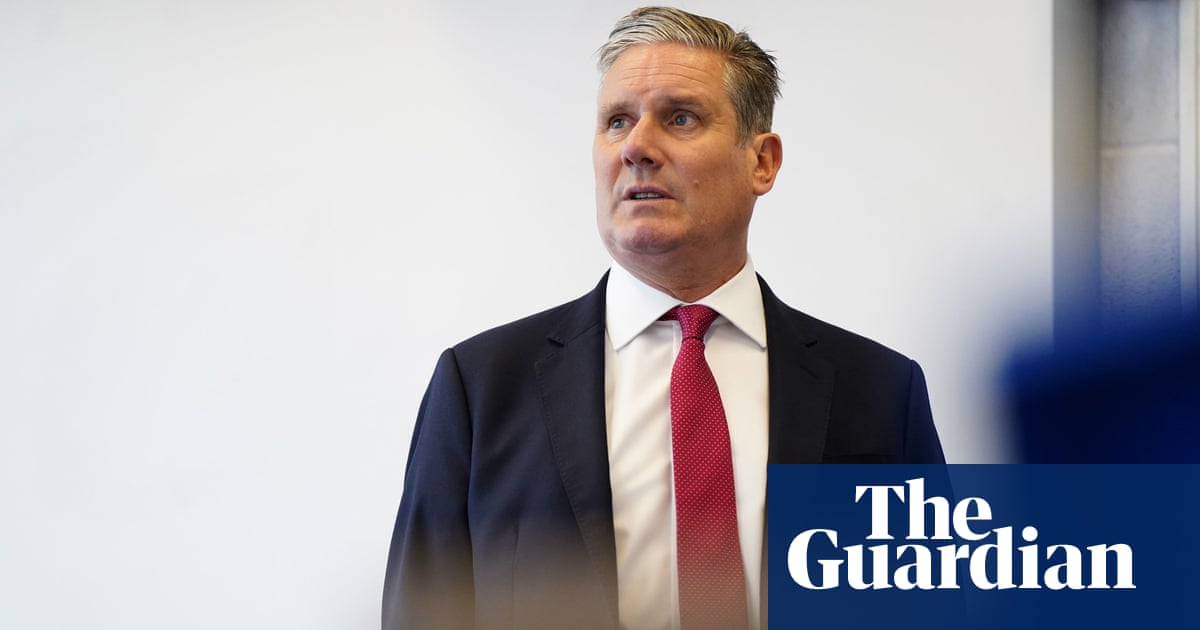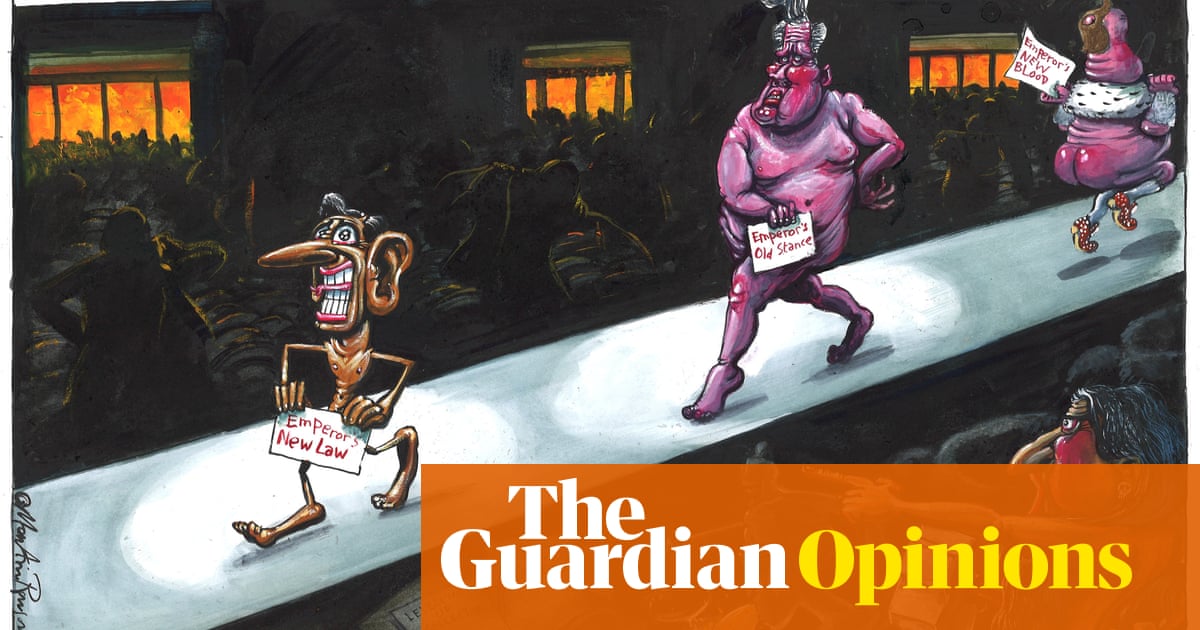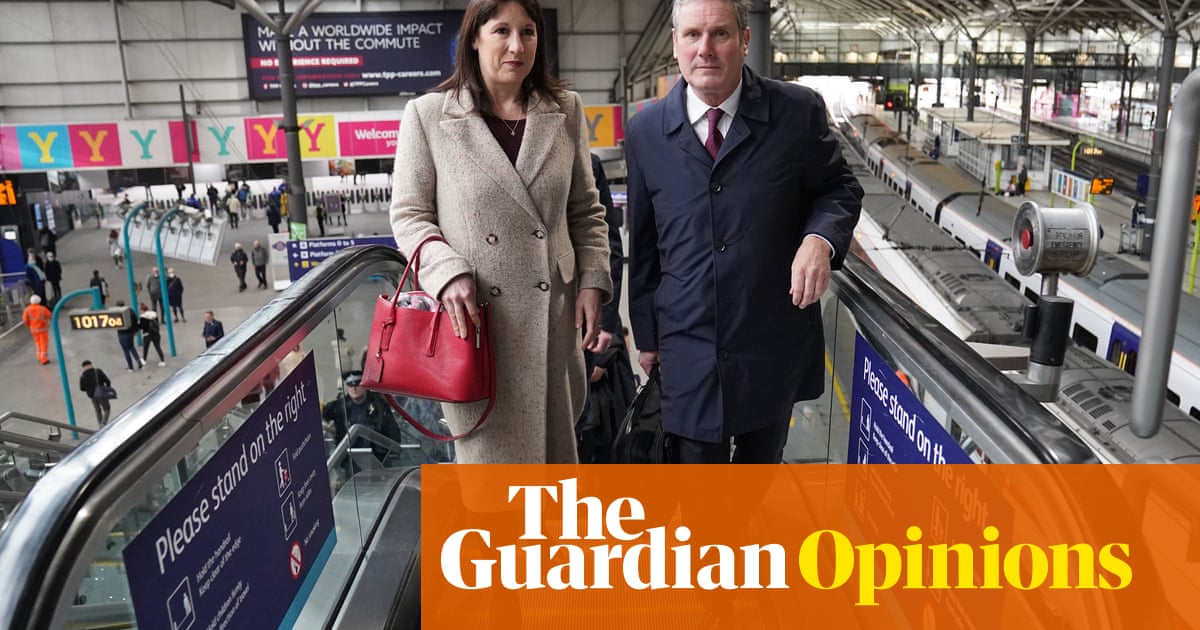
Gordon Brown and Keir Starmer are boarding a packed train under a departures board flashing chronic delays and cancellations and only to find themselves in a carriage strewn with luggage and people in the aisles.
The current state of the connections between London, Leeds and Edinburgh are an apt backdrop to the launch of Brown’s constitutional review, the most detailed plans yet for a future Labour government to hand powers to devolved administrations and English regions.
For the former prime minister, the conditions that produced the 1997 Labour landslide are even more acute now. Speaking to the Guardian on board the train, Brown says the desire for change in the UK is now bigger than in the run-up to that election.
“I think the last few months have been pretty decisive,” Brown says. “After ERM and 1992, the Conservatives lost a reputation for economic management. I think you can see in the last few months that Conservatives have lost that, I think it’s very difficult for them to recover it.” Starmer nods in agreement. “There’s a yearning for change,” says the Labour leader.
“I think the new Britain is a more powerful attraction as an idea to people than it was even in 1997,” Brown says, evoking the old slogan.
Brown’s commission talks about the feeling of Britain being in a state of “perpetual crisis”, which both politicians say they feel personally – the Leeds launch event for the review was disrupted by staff, stakeholders and journalists being delayed by cancelled trains.
“Are things broken? Try getting a GP appointment right now, try getting a train, try to get an operation, phoning a helpline. That’s because the economy has been severely damaged under this government,” Starmer says.
“We’ve had an argument about renewables, insulating homes … it’s just been languishing for years. The health service needs more people in it, but nobody’s been prepared to recruit so every year we’ve got the same cycle.
“We’ve got to get rid of the sticking plaster politics and have a serious, comprehensive plan for change and reform that is capable being implemented in the first term of Labour government.”
Internally, Labour is trying to walk a tightrope of restrained spending promises to demonstrate prudence, while billing a future manifesto as radical change. Two former Labour leaders, Brown and Ed Miliband, are the biggest proponents of the need to promise more – though they have a number of internal sceptics including in Starmer’s own team.
Starmer says the party cannot fall into the trap of the crisis cycle once in government, even if it inherits a damaged economy and ravaged public services.
“This is the big mistake, if you listen carefully to demands from business, they say simply trying to stabilise the economy with no plan for growth is a major mistake. We’ve got to break out of that vicious cycle of stagnation,” the Labour leader says.
With a poll lead hovering at about 20 points, Starmer allows himself to lapse into talking about the specifics of being prime minister, a marked change in confidence in as little as three months. He will still insist “complacency is the enemy … We need to fight as if we’re five points behind in the polls all of the time.”
But he does say the party is now advanced in its plans for the early days of government – and is therefore prepared to take a few more risks. He is far more robust on the implementation of controversial policies like the abolition of the House of Lords than some of the pre-briefing of the policy would have suggested.
“Yes, do the tough things first. We need to make the change that’s necessary,” he says. “We will have a limited number of absolutely clear missions in government as priority things to deliver.”
Brown insists that is necessary to use new political capital immediately after an election, an argument he has also been making privately in the run-up to the launch. “In 1997, we were determined to move very quickly. The Bank of England was made independent in four days.
“And what I see from Keir is a determination to have the discussion and consultation before the election. So the implementation can begin on day one after the election. And I think that is really very important because Britain, as we said, needs urgent surgery.”
Before Monday’s launch, there had been reports of tensions between the pair on the radicalism of the plan and private concerns about whether Starmer had the stomach for House of Lords abolition and major constitutional reform – or whether it should really be a first-term priority.
The Labour leader says he is prepared to take on vested interests from those comfortable with the status quo on the Lords. “Nobody is really prepared to defend the House of Lords as it is.”
Behind the scenes over the past two years, Brown has been forceful in pressing the necessity to be bold to shadow cabinet ministers, some of whom have been deeply sceptical about a Labour government immediately handing away powers they have been kept from for 12 years.
A version leaked to the Guardian earlier this summer was said by some in Labour to be a more radical early draft – but very little has actually changed in the final version, a sign Brown has won many of the internal battles.
Even in the 11th hour, when Labour briefing over the weekend played down the urgency of Lords abolition, in public Starmer’s own words have been far more categorical that he intends to start changes as soon as he enters office.
The report will hand swathes of powers to regions including on jobs, skills, transport and research funding, as well as a root-and-branch reform of Westminster, including ending second jobs for MPs and a jury of citizens setting standards for parliamentarians.
It is extraordinarily wide-ranging and sometimes unwieldy, traversing from recommendations on extending privilege status to speeches in the Scottish parliament to the functions of a British business bank.
Last week, shadow cabinet ministers saw a draft version of the report and remarked on how long it was, but were told there was likely to be an edit. The final report was 15 pages longer.
During their conversations between Leeds and Darlington, Brown is keen to let Starmer take the lead, though there are moments where it is clear he might be inclined to go further than the Labour leader will go – including on further interventions on the cost of living crisis including on fuel poverty, or on the harm Brexit has done to the economy.
Starmer, who earlier told the BBC he did not think returning to the single market would boost economic growth, will not say that Brexit in itself has been what has damaged the economy.
“The deal we have got has been harmful, the deal has holes in it left, right and centre,” he says. But should Labour still be afraid to say Brexit has been damaging? “The government’s deal has done damage to our economy,” he says. “But we are failing on growth way before we had a referendum or left the EU.”
Has Brexit not made it worse? “This deal is not helping with our economy and we intend to improve on it.”
Brown will not demur from Starmer’s stance in public, though he smiles. “I agree with what Keir said. But inside or outside the EU, we do not have an industry policy. It is ultimately neoliberal ideology that is stopping businesses getting the support.”












